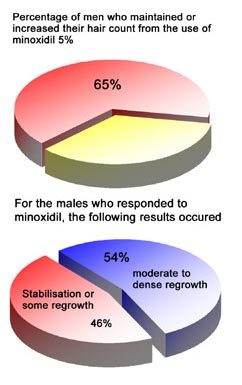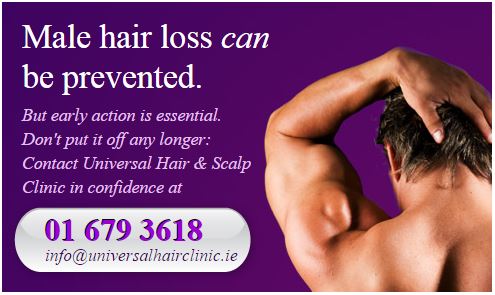Minoxidil Treatments
What is Minoxidil?
Minoxidil was first used in tablet form as a medicine to treat high blood pressure, but it was noticed that some patients being treated with Minoxidil experienced excessive hair growth (hypertrichosis) as a side-effect. Further research showed that by applying Minoxidil in solution form directly to the scalp, it could prove to be beneficial to those experiencing topical hair loss.
How Minoxidil Helps Reduce Hair Loss and Increase Hair Growth
Whilst minoxidil encourages hair growth and hair loss stabilisation, the exact molecular mechanism operating in the cells that result in hair growth from Minoxidil is not known. Some experts believe that minoxidil dilates the blood vessels around hair follicles, increasing the nutrient supply and encouraging increased hair growth, however, this is still an unproven theory, as vasodilator drugs other than Minoxidil do not appear to promote hair growth.
 Another theory is that topical Minoxidil induces a significant increase in DNA synthesis in hair follicle cells. Minoxidil is a stable and inactive drug. When applied to the scalp and absorbed into the skin Minoxidil is converted to an active, unstable product called ‘Minoxidil Sulphite’. Our body produces a catalyst called sulfonyl transferase that converts the inactive Minoxidil into the unstable active Minoxidil Sulphite. Minoxidil sulphite activates potassium channels in cells and this is thought to lead to hair growth. Whilst there is no conclusive evidence as to why Minoxidil encourages hair growth, the fact is that it does, be it to varying degrees.
Another theory is that topical Minoxidil induces a significant increase in DNA synthesis in hair follicle cells. Minoxidil is a stable and inactive drug. When applied to the scalp and absorbed into the skin Minoxidil is converted to an active, unstable product called ‘Minoxidil Sulphite’. Our body produces a catalyst called sulfonyl transferase that converts the inactive Minoxidil into the unstable active Minoxidil Sulphite. Minoxidil sulphite activates potassium channels in cells and this is thought to lead to hair growth. Whilst there is no conclusive evidence as to why Minoxidil encourages hair growth, the fact is that it does, be it to varying degrees.
What is Medroxyprogesterone?
Medroxyprogesterone (MPG) can be found in our Minoxidil 4 and 5% solutions depending on the recommendations of the trichologist for each individual. MPG helps to prevent the hormone derivative ‘dihydrotestosterone’ from interfering with the hair follicles function. This compliments Minoxidil’s reaction with the follicles, and adds to the response that is achieved. When MPG is added to Minoxidil it becomes a prescription-only treatment but in many cases Minoxidil will be provided without MPG contained.
Getting the Best From Minoxidil
Minoxidil can help reduce hair loss and boost hair growth, the degree of success will often depend on the Minoxidil’s strength. The Minoxidil formulations that our Doctors recommend vary from a mild 4% lotion to a stronger 5% Regain lotion, or an extra-strength 12.5% cream, which is a form of Minoxidil used to treat very stubborn patches of thinning hair and baldness, depending on what is recommended to the individual hair loss sufferer.
A Universal Clinic hair loss treatment course consists of more than just Minoxidil, if prescribed, we find that ‘treatment courses boosters’ are just as important. Find out about treatment course boosters and how a Universal Clinic hair loss treatment course ensures the highest likelihood of hair re-growth.
Side Effects
Like most other drugs there can be side effects from the use of Minoxidil. During the past ten years of treating tens of thousands of men and women at one hair loss centre in London they estimated less than one in one hundred (1%) incidents of side effects from the use of Minoxidil. Side effects from Minoxidil ranged from mild facial hair growth, headaches, rashes and palpitations. All were mild and needed no medical treatment. They either diminished in a short time during use of Minoxidil, or shortly after stopping use of Minoxidil.
For more information or to discuss your individual case, please contact our friendly, experienced staff at 01 6793618 or info@universalhairclinic.ie.

